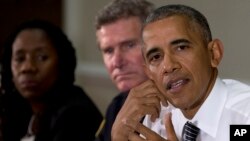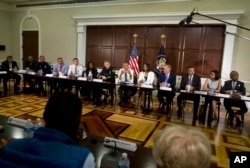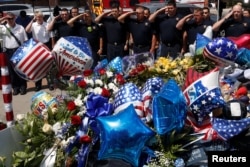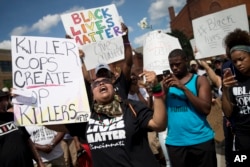For the second straight day, U.S. President Barack Obama is holding a lengthy discussion with Americans about race relations and how police treat minority communities.
Obama's unusual town-hall meeting is being conducted Thursday afternoon in Washington and then aired Thursday night on ABC and its affiliated television and radio networks in the U.S., and also shown worldwide on the BBC World News Network.
Obama is the country's first black president. But as he nears the end of his eight years in the White House, he is faced with a CBS News-New York Times poll showing that more than two-thirds of Americans believe that race relations in the country are bad and that racial discontent is at the highest point of his presidency.
Obama met Wednesday for four hours at the White House with law enforcement leaders and prominent members of the black community, but said the U.S. is still nowhere close to healing the decades-long buildup of mistrust between the two sides.
"We're not there yet, we're not even close to being where we want to be," Obama said.
"We're not at a point yet where communities of color feel confident that their police departments are serving them with dignity and respect and equality and we're not there yet where police departments feel adequately supported at all levels," he said.
Diverse group involved
A large and diverse group participated in the exchange of ideas, including Attorney General Loretta Lynch, Louisiana Governor John Bel Edwards, Los Angeles Mayor Eric Garcetti, NAACP President Cornell Brooks, other elected officials, police chiefs from several major cities, activists representing the Black Lives Matter movement, and several faith leaders.
The president said he wanted to bring people into the room with different perspectives to listen to each other.
The meeting was called in response to harrowing events last week that have many Americans anxious and upset. Two black men were shot by white police officers at point-blank range in the states of Louisiana and Minnesota. At a rally protesting those deaths, five Dallas, Texas, police officers were gunned down by a black gunman who said he wanted to kill white people.
White House spokesman Josh Earnest said Thursday, "I think the president is responding to a lot of emotions that people are feeling across the country, including profound sadness in the police killing, worries about racial profiling. Those are concerns the president shares."
After Wednesday's White House meeting, which went on much longer than planned, the president said the good news is that progress has been made in many police departments across the country. He said the conversation would build off his administration's "Task Force on 21st Century Policing," and would share solutions from communities that have already found ways to build trust and reduce racial disparities.
But he added this sober assessment: "There is no doubt police departments still feel embattled and unjustly accused. There is no doubt that minority communities — communities of color — feel it just takes too long to do what's right. The pace of change is going to feel too fast for some, too slow for others."
Tension likely to remain
Because this is a big country, "I think it is fair to say we will see more tension between police and communities this month, next month, next year, for quite some time," Obama said.
The president said progress on preventing shootings like last week's incidents will not happen overnight, because the roots date back not just decades, but centuries. "What we can do," he said, is to set up a series of respectful conversations to make sure we hold ourselves accountable for getting better.
"We have to sit down as a country and just grind it out," Obama said.
The meeting did produce a list of priorities that Obama said everyone at the table agreed upon, which included working with police departments to improve training and de-escalation techniques and creating a "system of accountability" that would grant citizens greater access to data on law enforcement actions.
Los Angeles Mayor Eric Garcetti said the conversation on race was extremely urgent, and that although not everyone agreed on everything, the activists, police officers and elected officials present were able to re-establish a sense of common humanity.
Several participants spoke of a breakthrough moment, saying every single person had a chance to speak, and people felt like they were truly being heard by those normally on the opposite side of the divisive issue of race and law enforcement.
Garcetti said a breakthrough moment for him was when one of the Black Lives Matter activists turned to a police officer and told him he was sorry for the loss of five police officers shot in Dallas last week by a sniper.
The conversation on race took place on the same day funerals were held in Dallas for three of the five police officers killed last week.
In the U.S. Senate, Republican Senator John Cornyn of Texas introduced legislation that would make it a federal crime to kill a police officer. In a statement, Cornyn said: "As our country continues to grieve following last week's tragedy in Dallas. We must come together in support of those who risk everything to keep us safe."
On Facebook, Obama asked Americans from all walks of life to share their own ideas for healing racial wounds and keeping people safe: "Going forward, I want to hear ideas from even more Americans about how we can address these challenges together as one nation. That means you. Whether you're a police officer working to keep our communities safe, an activist marching and organizing, or anyone else, you can share your story and ideas here: go.wh.gov/VDPvKz."







